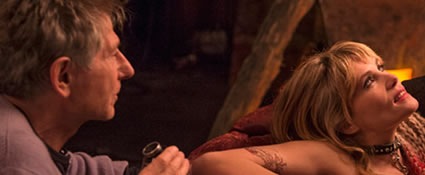We find out more about Polanski’s latest film…
Last year, Roman Polanski’s follow up to CARNAGE – VENUS IN FUR – screened at the Cannes Film Festival. The film is the story of a frustrated theatre director trying to cast the female lead in his latest play, who is just about to give up hope when an unknown actress arrives at the theatre, and begs for an audition.
VENUS IN FUR is adapted from David Ives’s stage play, and stars Emmauelle Seigner and Mathieu Amalric in a dominator/dominatrix relationship. We caught up with the film’s director at last year’s Cannes press conference to find out more about his film, adapting from stage plays and whether he dominated his actors, or vice versa…
There seem to be several references to your previous works in VENUS IN FUR, was this part of the draw?
Roman Polanski: It’s really the opposite, I didn’t realise, but when I think about this matter, I do concur that there are quite a lot of things that are reminiscent of my other films.
In your other films there does not seem to be the notion that there is pleasure to be had in being complicit with Sadism, was this something you wanted to explore?
RP: It was the satire on sexism that was very seductive in this film. There is an element in Mathieu’s character that is really torn to pieces, and was quite enjoyable. People who know me, know that I am not this way, so I had satisfaction in doing it.
You have done several adaptations, were there any particular challenges with this adaptation?
RP: The challenge, obviously, was not to bore the viewer. To have two people in one place it’s very very tricky, and to keep the audience on the edge during the whole piece is the natural challenge. It was exciting to me, not only being the main difficulties, but also it was a source of excitement.
The film is adapted from a play, which in turn was adapted from a book. How useful was it to have so much source material to go on?
RP: I think that source is without any interest to us; it’s the result that we deal with. Whether you know or not where it comes from is secondary, whether it comes from a play, a book, or directly from the horse’s mouth. When the text is good it’s good to play, and that text is just terrific.
How did you decide to play with the space in the theatre building for the movie?
RP: David’s play takes place in an audition room. When I read the play I thought ‘If I were to adapt this…’ and I wanted to because I found the text hilarious… Incidentally, I was given this text here last year. I was in Cannes for a screening of Tess, and my agent gave me this saying ‘Here is something that is right up your alley’, and I decided to make the film. Right away, I was thinking if I were to adapt it, I would do it in a theatre because in France, unlike the US, we very often audition in the theatre. Since I grew up in the theatre – at 14 I had a lead in a play in Poland, these are my beginnings – I had a particular relationship, so to speak, with an empty theatre. I thought that would be a terrific place for it, so we built that set; it’s not a real theatre, and that gave us the possibility of moving around. You don’ feel claustrophobic like you would in one room. It would be dreadfully boring, in my opinion, and unadaptable, if someone were to adapt the original setting for it.
What were the challenges of working with just two actors in such a big space?
RP: It was my dream to make a film with only two actors. My first picture was KNIFE IN THE WATER; three characters on a boat. I thought two would be a real challenge. I see no difficulty in making a film of this kind; it went very simply and quickly.
How did you work with your actors?
RP: Oh, I dominated them tremendously! That’s what the film is about! I slapped them sometimes when I could, but they never complained! [laughs]
Why did you decide to make the film in French?
RP: When I read the text, I thought ‘This is perfect for Emmanuelle’, but I wanted her to portray the character just the way I wanted, so of course the film had to be in French, and the film had to be shot in France, therefore in a French theatre. Once we had assimilated the script, she stunned me, and I expected to be stunned. Emmanuelle wasn’t that enthusiastic when I asked her to read it in English, and I really had to force her hand.
Do you believe there is still a script out there, like CHINATOWN, that is waiting to be made?
RP: Well there is something there in the universe that is waiting, but whether it is going to cross my way, that I am not sure of. It would be interesting, but there are other things to be made, which may be the equivalent.
VENUS IN FUR is released in Irish cinemas from May 30th
Words: Brogen Hayes


